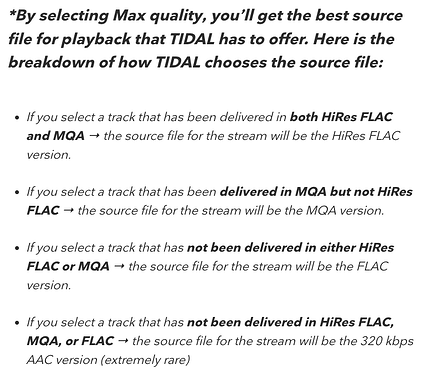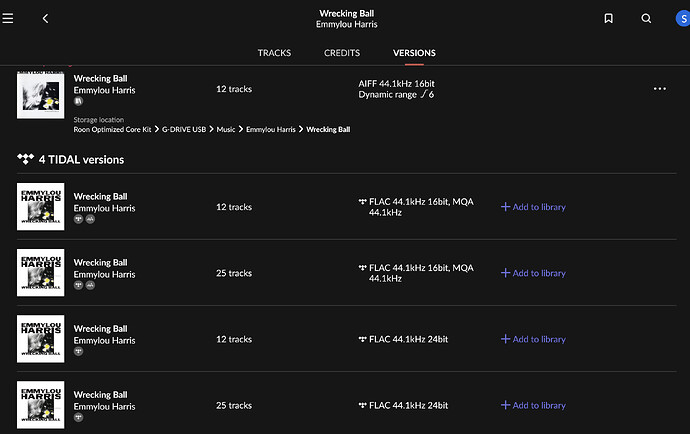So is your original question resolved (“MQA 192 24 disappeared”)? What are you expecting to see different?
No this is the only 192 24 MQA I can find on Roon. Is this still left exposed, hence are the others there but hidden by ROON as others suggest if you could get back to previous ROON versions then 192 24 MQA could still there. Hence is it ROON that is denying me access or TIDAL. Really would like TROON staff to respond.
Do you have an example of 192 24 MQA that you can find in the TIDAL app but not on Roon? When TIDAL adds a hi-res FLAC version to their catalog, the MQA version is no longer available.
This is from the TIDAL support page.
https://support.tidal.com/hc/en-us/articles/203055911-High-Fidelity-Sound-Optimization
I suspect Roon is only able to access what Tidal permits. The only reason I can see why Tidal would disallow access to the MQA version of a file, effectively hiding it behind availability of a straight flac encoding, is that the MQA file is going to be deleted in time.
Bottom line - I think we’re stuffed… ![]()
The reason this is still exposed is because it hasn’t been replaced by a hires version. They do offer a 44/16 CD version though. But if there was a 192/24 hires files was there, the MQA version wouldn’t be shown anymore. I’m assume this album just slipped thru the cracks.
Bah! I can see and play an MQA file resident on Tidal via the BluOS app - so, I know it’s still there. Why can’t Roon access it?
Because Tidal sends the high resolution flac file if it is available.
EDIT: If you don’t like the direction Tidal has taken, you’ll need to take it up with Tidal, not Roon.
That’s nonsensical, given MQA, unlike FLAC is time-corrected, therefore closer to what was recorded.
You have to discuss this with Tidal. They are switching away from a proprietary and likely dead format without a future to one that lets Tidal survive.
The claim about time correction is dubious at best
time domain correction is one of the primary “raison d’être” for MQA.
Yes, hence it being dubious ![]()
Yes, and for how many recordings did anyone write down all the ADCs that were used on which tracks. The whole idea is as if they thought recording studios are run by BBC men from the fifties in white lab coats
for recordings made in the analog domain, and encoded/remastered, one would know the whole digital chain. I’ve said many times, in these here pages, that older, 16/44 albums sound particularly good in MQA. I’d want it for those alone.
in the Emmylou Harris example above, the 16/44 MQA files sound superior to the 24/44 FLAC.
How so, unless one has a nerdy engineer. Very often, individual tracks are even recorded in different studios by different engineers. Where is this information?
What you say is a best true for a small percentage of music.
again, these recordings are analog.
All MQA will be eventually phased out so frankly I wouldn’t bend over backwards to roll back.
No idea what this has to do with anything. Obviously they have been converted to digital or they wouldn’t be in files, and the MQA claim is concerned with the ADC.
For how many of these recordings are the converters known and where is this information?
Well, I do know what ADC was used for Emmylou Harris “Wrecking Ball.”
Pacific Microsonics Model One
Because “Wrecking Ball” was a relatively early HDCD. Complete with HDCD encoded Peak Extension dynamic range expansion. Which MQA encoding has obliterated, making the HDCD encoding unrecoverable, thereby locking in the dynamic range compression forever.
https://dr.loudness-war.info/?artist=Emmylou&album=Wrecking
Unsurprisingly, woodford used a bad example to plug MQA again. Or just has bad taste in dynamic range compression.
AJ
Yeah that’s one.

